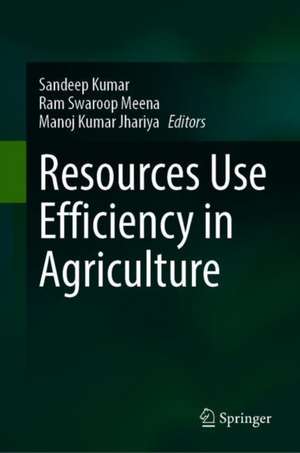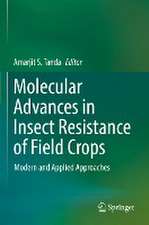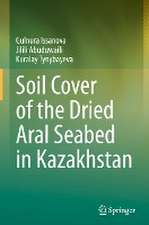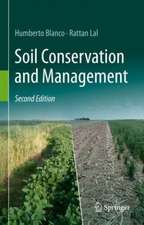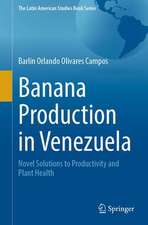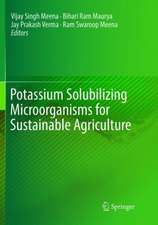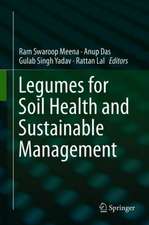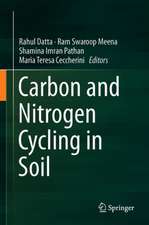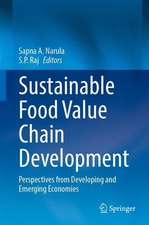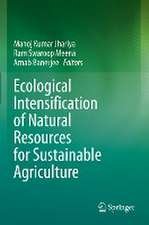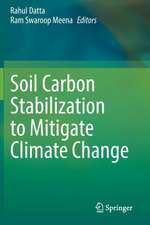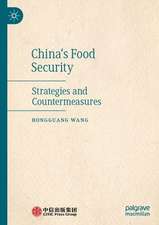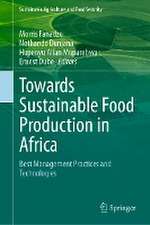Resources Use Efficiency in Agriculture
Editat de Sandeep Kumar, Ram Swaroop Meena, Manoj Kumar Jhariyaen Limba Engleză Hardback – 19 sep 2020
Achieving zero hunger and food security is a top priority in the United Nations Development Goals (UNDGs). In an era characterized by high population growth and increasing pressure on agricultural systems, efficiency in the use of natural resources has become central to sustainable agricultural practices. Fundamentally speaking, eco-efficiency is about maximizing agricultural outputs, in terms of quantity and quality, using less land, water, nutrients, energy, labor, or capital. The concept of eco-efficiency involves both the ecological and economic aspects of sustainable agriculture. It is therefore essential to understand the interaction of ecosystem constituents within the extensive agricultural landscape, as well as farmers’ economic needs.
This book examines the latest eco-efficient practices used in agro-systems. Drawing upon research and examples from around the world, it offers an up-to-date overview, together with insights into directly applicable approaches for poly-cropping systems and landscape-scale management to improve the stability of agricultural production systems, helping achieve food security. The book will be of interest to educators, researchers, climate change scientists, capacity builders and policymakers alike. It can also be used as additional reading material for undergraduate and graduate courses on agriculture, forestry, soil science, and the environmental sciences.
| Toate formatele și edițiile | Preț | Express |
|---|---|---|
| Paperback (1) | 1225.40 lei 38-44 zile | |
| Springer Nature Singapore – 20 sep 2021 | 1225.40 lei 38-44 zile | |
| Hardback (1) | 1406.66 lei 3-5 săpt. | |
| Springer Nature Singapore – 19 sep 2020 | 1406.66 lei 3-5 săpt. |
Preț: 1406.66 lei
Preț vechi: 1715.44 lei
-18% Nou
Puncte Express: 2110
Preț estimativ în valută:
269.20€ • 280.01$ • 222.24£
269.20€ • 280.01$ • 222.24£
Carte disponibilă
Livrare economică 24 martie-07 aprilie
Preluare comenzi: 021 569.72.76
Specificații
ISBN-13: 9789811569524
ISBN-10: 9811569525
Pagini: 760
Ilustrații: XII, 760 p. 167 illus., 128 illus. in color.
Dimensiuni: 155 x 235 mm
Greutate: 1.18 kg
Ediția:1st ed. 2020
Editura: Springer Nature Singapore
Colecția Springer
Locul publicării:Singapore, Singapore
ISBN-10: 9811569525
Pagini: 760
Ilustrații: XII, 760 p. 167 illus., 128 illus. in color.
Dimensiuni: 155 x 235 mm
Greutate: 1.18 kg
Ediția:1st ed. 2020
Editura: Springer Nature Singapore
Colecția Springer
Locul publicării:Singapore, Singapore
Cuprins
Chapter 1: Waste recycling for the Eco-friendly Input Use Efficiency in Agriculture.- Chapter 2: Earthworms for Eco-friendly Resource Efficient Agriculture.- Chapter 3: Biopesticides for Agriculture and Environment Sustainability.- Chapter 4: Precision Agriculture for Resource Use Efficiency.- Chapter 5: Nanomaterials for Agriculture Input Use Efficiency.- Chapter 6: Solar Radiation and Nitrogen Use Efficiency for Sustainable Agriculture.- Chapter 7: Nitrogen and Phosphorus Use Efficiency in Agroecosystems.- Chapter 8: Long-Term Impact of Fertilizers on Soil and Rice Productivity.- Chapter 9: Organic Sources and Tillage Practices for Soil Management.- Chapter 10: Technical Efficiency in Agriculture.- Chapter 11: Agrochemicals Impact on Ecosystem and Bio-monitoring.- Chapter 12: Plant Biotechnology for Agricultural Sustainability.- Chapter 13: Soil and Water Conservation Measures for Mediterranean Fruit Crops in Rainfed Hillslopes.- Chapter 14: Efficient Use of Soil in Silvopastoral Systems of Native Forests.- Chapter 15: Water Resource and Use Efficiency under Changing Climate.- Chapter 16: Recovery of Micronutrients in Alkaline Soils: Recent Challenges and Future Perspectives.- Chapter 17: Biofortification of Cereals with Zn and Fe: Recent Advances and Future Perspectives.- Chapter 18: Resources Management for Sustainable Sugarcane Production.- Chapter 19: Linking Sustainability and Competitiveness of Almond Plantations under Water Scarcity and Changing Climate.- Chapter 20: Efficiently Groundcovers in Mediterranean Olive Groves under Changing Climate.
Notă biografică
Dr. Sandeep Kumar is currently working as a scientist (Agronomy) at the Division of Crop Production, ICAR-Indian Institute of Pulse Research, Kanpur (UP), India. He obtained his Ph.D. from Choudhary Charan Singh Haryana Agricultural University, Hisar, India. His main research interest is in agricultural production for environmental sustainability. He has published four books and 30 papers in leading national and international peer-reviewed journals and has contributed to 18 book chapters. He has received numerous national awards, including Young Scientist, Best Research Scholar, and Best Master’s Thesis awards.
Dr. Ram Swaroop Meena is an agronomist and Assistant Professor at the Department of Agronomy, I.Ag. Scs., BHU, Varanasi (UP). Awarded a Raman Research Fellowship by the MHRD, GOI, he completed his postdoctoral research on soil carbon sequestration under Prof. Rattan Lal, Director, C-MASC, Columbus, USA. Dr. Meena has published more than 100 research and reviewpapers, 50 book chapters and 17 books. He has worked as an expert for the NCERT, MHRD, GOI. With more than 10 years of research and teaching experience, he is currently working on three externally funded projects (DST, MHRD, ICAR).
Manoj Kumar Jhariya is an Assistant Professor at the Department of Farm Forestry, Sant Gahira Guru Vishwavidyalaya (Formerly Sarguja University) Ambikapur (Chhattisgarh), India, and the author or co-author of more than 60 scientific papers, 30 book chapters and seven books. Dr. Jhariya acquired his B.Sc. (Agriculture), M.Sc. and Ph.D. (both in Forestry) degrees from Indira Gandhi Krishi Vishwavidyalaya, Raipur, Chhattisgarh, India. Dr. Jhariya was awarded a UGC-RGNF Fellowship, New Delhi, India, and received a Chhattisgarh Young Scientist Award from Chhattisgarh Council of Science and Technology in 2013. He is an editorial board member for several journals and a life member of numerous societies.
Textul de pe ultima copertă
Achieving zero hunger and food security is a top priority in the United Nations Development Goals (UNDGs). In an era characterized by high population growth and increasing pressure on agricultural systems, efficiency in the use of natural resources has become central to sustainable agricultural practices. Fundamentally speaking, eco-efficiency is about maximizing agricultural outputs, in terms of quantity and quality, using less land, water, nutrients, energy, labor, or capital. The concept of eco-efficiency involves both the ecological and economic aspects of sustainable agriculture. It is therefore essential to understand the interaction of ecosystem constituents within the extensive agricultural landscape, as well as farmers’ economic needs.
This book examines the latest eco-efficient practices used in agro-systems. Drawing upon research and examples from around the world, it offers an up-to-date overview, together with insights into directly applicable approaches for poly-cropping systems and landscape-scale management to improve the stability of agricultural production systems, helping achieve food security. The book will be of interest to educators, researchers, climate change scientists, capacity builders and policymakers alike. It can also be used as additional reading material for undergraduate and graduate courses on agriculture, forestry, soil science, and the environmental sciences.
Caracteristici
Focuses on resource use efficiency in agriculture and its importance in sustainability Describes system-based sustainable approaches to environmentally friendly agriculture Explores resource management strategies and their roles in soil health improvement
